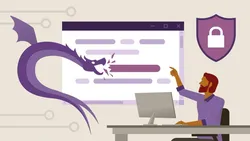
Kali Linux Essentials For Ethical Hackers - Easy Kali Linux Tutorial For Beginners Full Basic Course 
This course is designed to teach the basics of ethical hacking and Kali Linux. It covers topics such as running Kali Linux on VMware, Linux keyboard shortcuts, managing Kali Linux files and directories, and enumerating system information. It also provides tutorials on how to use Kali Linux for ethical hacking. This course is perfect for beginners who want to learn the fundamentals of ethical hacking and Kali Linux. ▼
ADVERTISEMENT
Course Feature
![]() Cost:
Cost:
Free
![]() Provider:
Provider:
Youtube
![]() Certificate:
Certificate:
Paid Certification
![]() Language:
Language:
English
![]() Start Date:
Start Date:
On-Demand
Course Overview
❗The content presented here is sourced directly from Youtube platform. For comprehensive course details, including enrollment information, simply click on the 'Go to class' link on our website.
Updated in [May 25th, 2023]
This course provides an introduction to Kali Linux for ethical hackers. It covers the basics of running Kali Linux on VMware without installing, as well as useful keyboard shortcuts of the terminal. Additionally, the course covers how to manage Kali Linux files and directories, and how to enumerate systems information in Kali Linux. By the end of the course, learners will have a better understanding of the fundamentals of Kali Linux and how to use it for ethical hacking.
[Applications]
After completing this course, students can apply their knowledge of Kali Linux to ethical hacking and security testing. They can use the Linux commands and keyboard shortcuts to navigate the system and manage files and directories. They can also use the tools and techniques learned in the course to enumerate system information and identify potential security vulnerabilities. Additionally, they can use the skills acquired in the course to create their own custom scripts and tools to automate security testing tasks.
[Career Paths]
1. Ethical Hacker: Ethical hackers use their knowledge of computer systems and networks to identify potential security risks and vulnerabilities. They use their expertise to develop strategies to protect organizations from malicious attacks. As the demand for cyber security increases, ethical hackers are in high demand.
2. Penetration Tester: Penetration testers use their knowledge of computer systems and networks to identify potential security risks and vulnerabilities. They use their expertise to develop strategies to protect organizations from malicious attacks. As the demand for cyber security increases, penetration testers are in high demand.
3. Security Analyst: Security analysts are responsible for monitoring and analyzing security threats and vulnerabilities. They use their knowledge of computer systems and networks to identify potential security risks and vulnerabilities. They use their expertise to develop strategies to protect organizations from malicious attacks.
4. Cyber Security Engineer: Cyber security engineers are responsible for designing, developing, and implementing security systems and solutions. They use their knowledge of computer systems and networks to identify potential security risks and vulnerabilities. They use their expertise to develop strategies to protect organizations from malicious attacks. As the demand for cyber security increases, cyber security engineers are in high demand.
[Education Paths]
1. Bachelor of Science in Cybersecurity: This degree path provides students with the knowledge and skills to protect computer networks and systems from malicious attacks. It covers topics such as cryptography, network security, computer forensics, and ethical hacking. As the demand for cybersecurity professionals continues to grow, this degree path is becoming increasingly popular.
2. Master of Science in Information Security: This degree path provides students with a deeper understanding of the principles of information security. It covers topics such as risk management, security architecture, and secure software development. This degree path is ideal for those looking to pursue a career in information security or cybersecurity.
3. Bachelor of Science in Computer Science: This degree path provides students with the knowledge and skills to design, develop, and maintain computer systems. It covers topics such as programming, software engineering, and computer networks. This degree path is ideal for those looking to pursue a career in software development or computer engineering.
4. Master of Science in Computer Science: This degree path provides students with a deeper understanding of the principles of computer science. It covers topics such as artificial intelligence, machine learning, and data science. This degree path is ideal for those looking to pursue a career in data science or machine learning.
Course Provider

Provider Youtube's Stats at AZClass
Discussion and Reviews
0.0 (Based on 0 reviews)
Explore Similar Online Courses

Mindfulness and Well-being: Foundations

CorelDRAW Graphics Suite - Master CorelDRAW Quickly

Python for Informatics: Exploring Information

Social Network Analysis

Introduction to Systematic Review and Meta-Analysis

The Analytics Edge

DCO042 - Python For Informatics

Causal Diagrams: Draw Your Assumptions Before Your Conclusions

Whole genome sequencing of bacterial genomes - tools and applications

Learning Kali Linux

Learning Kali Linux on Windows

Learning Kali Linux
 Related Categories
Related Categories
 Popular Providers
Popular Providers
Quiz
 Submitted Sucessfully
Submitted Sucessfully
1. What is the name of the operating system used in this course?
2. What is the first step of the course?
3. Which of the following is not a step in the course?


Start your review of Kali Linux Essentials For Ethical Hackers - Easy Kali Linux Tutorial For Beginners Full Basic Course